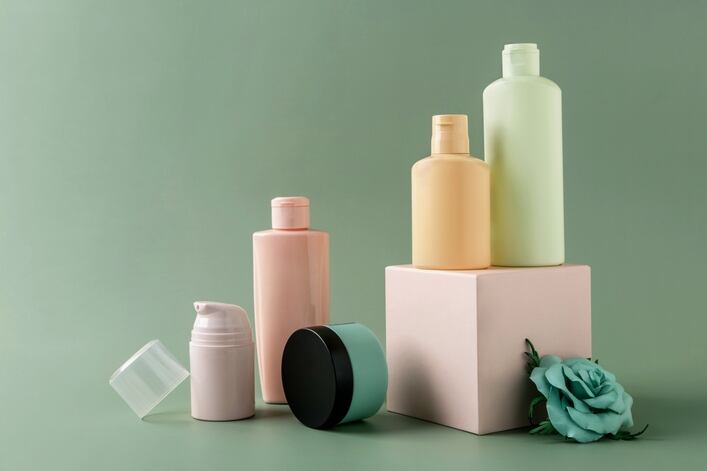The four personal care companies have entered into a value chain initiative to achieve circular packaging innovation in the cosmetics space in a bid to remove waste from the supply chain. The group is said to have partnered on their Design4Circularity project to design a packaging solution that creates a cleaner input waste stream and can go back into the loop in high-value applications.
On the design side, the companies sought to enable “high-quality visuals and distinctive shapes” that consumers associate with packaging and brands.
Speaking to Cosmetics Design Europe, a spokesperson for Clariant said the initiative was “inspired by the understanding that circularity can only happen in collaboration”.
“With Siegwerk, Borealis, Beiersdorf and Clariant, we have companies teaming up for whom all circularity is high on the agenda,” the spokesperson said.
Together the companies decided to demonstrate that comprehensive solutions can be achieved at a faster rate by working together. They held brainstorming sessions on different options and the impact these could have on achieving circularity, also taking into consideration the strengths of the collaboration partners, shared the Clariant spokesperson.
“With recyclate quality being one of the challenges in increasing circularity in packaging, it became clear that designing packaging so it is able to become a cleaner waste stream for re-use in packaging, can address this challenge,” the spokesperson added.
“Because the solution allows brand appearance to be maintained, facilitating consumer acceptance and brand loyalty, and simultaneously provides circular packaging, it offers the possibility for the personal care industry to move more quickly towards the targets of achieving circular packaging with significant amounts of recycled content,” the spokesperson said.
Final design
Conceptualising and creating their final concept saw the collaborators land on a colourless polyolefin bottle with 100% Post-Consumer Recycled (PCR) material in a full body design sleeved in a printed deinkable (the ability to remove ink) shrink sleeve. The companies designed the end-product packaging concept with materials that are said to be technically fully recyclable and have the potential to be recovered and reused for the same application.
“The Design4Circularity packaging solution is ground-breaking for future cosmetics applications,” said Stefan Rüster, packaging expert at Beiersdorf. “Through the hard work and innovation power of all collaboration partners involved, we have managed to combine the high design requirements of a cosmetic packaging with full circularity,” he added.
In developing its circular packaging concept, the group settled on key design parameters to provide scope and direction for building their design. Polymer and additive composition, sleeve and bottle materials, sortability and deinking of sleeve material, recyclability and PCR quality were core critical design elements on which the foursome based the innovation.
Adding value through collaboration
Retaining product quality throughout multiple lifecycles, alongside eliminating waste and ensuring reuse, was a clear priority for the Design4Circularity team, with each company providing a specific function and area of expertise. Speciality chemicals business, Clariant, supplied performance additives to enhance and maintain the quality of the PCR content through multiple recycling cycles while avoiding degradation.
Centring on design for recycling additive solutions, Clariant aimed to ensure targeted additivation (adding additives to a particular material) to retain PCR quality and avoid polymer chain breakdown during the recycling process.
As well as achieving circularity, the companies wanted to allow different designs on the uncoloured bottle to appeal to various brands. As a result, the group landed on a full body shrink sleeve format to enable individual companies to add their branding to the product.
Beiersdorf, parent company of Nivea and Eucerin, oversaw the application quality and design of sleeve packaging, and was responsible for sorting trials at a recovery facility, pushing design for circularity initiatives and undertaking the evaluation of recyclability and PCR material safety.
Finding the right technology to achieve circularity was said to be crucial to the innovation and Austrian chemical company Borealis brought its proprietary advanced mechanical recycling technology Borcycle M to the project, providing PCR material for bottles. Meanwhile German ink manufacturer Siegwerk conveyed its knowledge of deinking technology and applicable printing inks for the shrink sleeve process.
The selected new ink composition is said to have been chosen to enable the deinking of the sleeve to be recyclable. The companies selected the specific bottle and shrink sleeve combination to allow for its removal at materials recovery facilities.
First trial results
Initial sorting trials in the existing recycling infrastructure have taken place to examine the circularity of the devised packaging concept. First analyses demonstrated that the sortability of the full body sleeved HDPE bottle is possible, subsequently “achieving a high recovery of the bottle’s material”, Clariant reported. Furthermore, the team performed trials with the full-body sleeved, transparent PET bottles and showed similar findings, it stated.
However, the group believes that more advancements in sorting technology are required “to achieve the ultimate goal of circular economy to give colourless bottles a second life back in colourless applications retaining their highest value”. Various technologies, including digital watermarking or artificial intelligence, have been earmarked as potential solutions to enable the industry to reach sustainability goals, such as circularity in cosmetics packaging.
“Only together with like-minded partners can we shape an ‘ever mindful’ tomorrow,” said Peter Voortmans, Global Commercial Director Consumer Product of Borealis. “It starts with packaging design in combination with the right sorting and recycling infrastructure, and through collaboration, we reinvent essentials for sustainable living,” he added.



